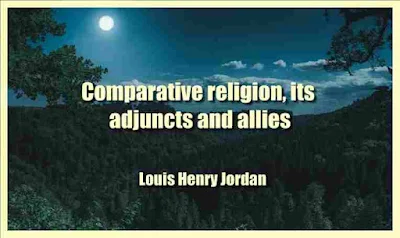Download Comparative religion - by Louis Henry Jordan - PDF ebook
Comparative religion, its adjuncts and allies
A literary project, outlined tentatively in 1905, is now to be carried into effect. The obstacles which for a time effectively barred its progress have at last happily been surmounted. Fifteen years have passed since the author resolved to make an honest attempt to provide a competent exposition of Comparative Religion.
The study of this subject — its rise, its sources, its various transitions, its unutilized capabilities, its hazards, and its probable issues — had already engaged his attention for a somewhat lengthy period. During all that time he prosecuted divers inquiries with diligence and eagerness, for he had yielded to the lure of a quest which had thrown its fascination over him; but, unfortunately, he had to content himself with devoting to these studies only the scanty leisure which he was able to command.
The increasingly-insistent needs of the situation, however, seemed to summon him to concentrate his energies upon investigations that promised to yield important results within the not very distant future. Besides, a great deal of the preliminary minutiae of research in this field had already been mastered.
Accordingly, after due consideration, the fateful step was taken. Existing professional ties were severed. An earlier roving commission as a ' student at large ' being resumed, the responsibilities of a long and exacting task were deliberately accepted.
During the intervening years, the opportunity of occupying a theological chair has more than once presented itself. Had these proposals come earlier, or had they seemed likely to promote the one aim which the author had in view, they would no doubt have proved a serious temptation. But none of them portended the establishment of a chair for Comparative Religion.
All of them threatened to introduce unwelcome restraints, and possibly ' dogmatic ' restrictions. All of them were certain to lessen the author's chances of carrying his studies forward to some satisfying and comprehensive conclusion.
Hence these seducements were unheeded and the work of investigation went on, though not without many inevitable interruptions. And now, at the close of the period of preparation, — devoted very largely to travel, observation, and research among the peoples and sacred cities of the East and of the West — it seems desirable that the results actually secured should be reviewed, and that the progress achieved thus far should be reported and recorded. In 1900, students of Comparative Religion were still very limited in number.
The general public evinced no interest in the investigations which were being conducted; on the contrary, in so far as such inquiries had been initiated, they were not only regarded with indifference but (in many quarters) they were viewed with unmistakable and outspoken distrust. Moreover, scholars of experience counselled a further postponement of any attempt to make a material advance. With practical unanimity, they declared that the author's proposed undertaking, being almost certainly premature, was doomed to mishap and failure.
It was urged that the boundaries of Comparative Religion were for the present too obscure, and also too indeterminate, to permit of any experiment surmounting the handicap of the unfavourable conditions which prevailed.
These advisers, no doubt, were right; they interpreted, quite accurately, the signs of the times; nevertheless, a good deal has been accomplished in the interval. The author recognized, when he entered upon his task, that the results at which he would arrive must be general and merely provisional in character. On the other hand, a definite and feasible scheme of exposition had already begun to take shape in his mind.
Moreover, the fact that there existed much confusion of thought touching the legitimate range of this study constituted for him an appeal that became increasingly alluring and clamant. He modestly hoped, also, that he might be able to hasten the day when some real achievement in this field would be welcomed and acknowledged among progressive scholars everywhere.
At the end of five years, with many natural misgivings, an initial volume was completed and sent to the press.1 It sought to do no more than present a rapid survey of a field which was afterwards to be more critically examined. It was proposed, at that time, to follow up this preliminary conspectus with two volumes of a less summary and transient character; but the original programme has since been recast, and will now be framed in an entirely different manner.
In the following year, a quadrennial review of the current literature of this study was founded.2 Subsequently, a series of monographs throwing light upon the progress and prospects of Comparative Religion in the chief Universities of the world was projected, and an introductory volume has
already been issued.
These successive publications, though representing in themselves valuable and substantial results, were however only so many steps leading towards a goal that had been kept in view from the very outset. At the same time, the experience gained in the preparation of these books steadily deepened a conviction that had very early asserted itself, viz. that Comparative Religion would never come to its own until its right to be pursued as a separate and self-governing discipline came to be generally conceded. Hitherto, this line of research has been regarded and expounded as a mere adjunct of Theology, Philosophy, History, or some other department of study; in future, it must be accorded a recognition commensurate with the rank to which it is demonstrably entitled.
A plea to this general effect was advanced, and briefly supported, in a paper read by the author at the Third International Congress for the History of Religions, held in Oxford seven years ago
Download 16 MB










